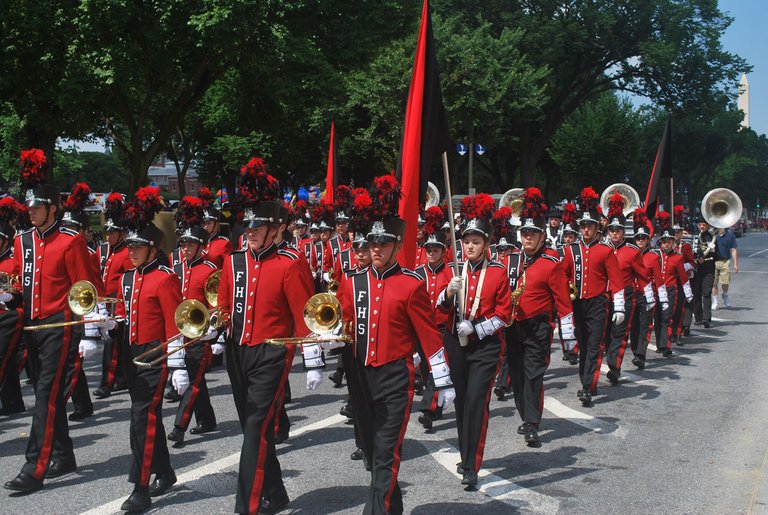
You might know what a march is. As in, you might know what I mean when I say “march.” A march is a general music style (I think it’s music that you march to), but this entry will be about American marches, such as the ones by John Philip Sousa or Karl King.
If you’re American, or if you’re not, you might be familiar with the trio of Sousa’s The Stars and Stripes Forever. In general, I have a hard time guessing how many people know about music stuff because I’m into certain music stuff a lot more than other people, but this song’s pretty pop culture. It’s the National March of the United States, after all. Anyway, it’s a good example of the genre of Sousa-style marches.
In fact, it’s a very good example, because nearly all of these marches are identical.
Okay, that’s a big exaggeration. There’s a lot of creativity that can go into marches, and the rules of these marches can be broken without much of a problem.
The thing is, many of them follow a very specific structure. There are actually a lot of specifics, so I can’t describe it all, but the similarities can make a lot of marches blur together. The saving grace for marches, unlike other, more popular genres of music which are similarly similar, is that every march is catchy. At least, in my opinion. They’re really fun to hum along to if you know them, and they’re easy to memorize because of their similarity and rigid structure (which is good for me when I’m in school; in a boring class where I can’t listen to my music, I gotta have a lot of hummable music in my head). And if you’re like me, you can constantly be guessing what staples the composer will include or leave in the piece while you’re listening, and get a good surprise when they throw in something different. And you can walk to them! Marches are literally made to be walked to. Well, marched to. They also have really fun melodies if you play an instrument. And since most of them are pretty old, you can find plenty of free sheet music online, and the U.S. Marine Band has volumes of Sousa march recordings and sheet music for free, which is super cool.
Today I listened to some marches. Two of them actually started in minor, which was interesting. One of them started the final repeat of the last section (strain) loud but decrescendoed and ended the song really quiet, which made me smile a bit, since a march is “supposed” to end on a loud note. In that same piece, I listened to the second strain that had a loud-quiet pattern, and went loud with the classic, satisfying diminished chord hit that I was anticipating a second before it happened. There's a good balance between standards and creativity that can keep marches interesting if you're one who likes to analyze music.
Moving on—Sousa was the King of Marches, but he wasn’t the only person to compose them. Karl King was another famous one. I haven’t listened to many of his, mainly because I'm too lazy to go beyond the U.S. Marine Band for my marches (they mostly play Sousa, since he was their conductor back in the day), but I’ve played Flying Cadets by King in band, and I’ve listened to a few others of King's, like a good one called Purple Pageant. There are other good composers of marches, but I don’t know any by memory.
So some other notable marches I know: As I mentioned, I’ve played Flying Cadets. It’s a really good example of a very typical march, so good to compare others to. The Liberty Bell by Sousa is the theme for Monty Python’s Flying Circus, specifically the second strain. It’s really catchy anyway, so all in all a good one. Plus, it has a bell in it. Revival March by Sousa is also a good one. It has four strains (It’s fourth strain is pretty), and repeats to go through the first three one last time before the song ends.
I have specific others that I arbitrarily like, but nothing special to mention about them. I suggest giving marches a listen, even if you aren’t that into that kind of stuff. You might like them. I always encourage diversity in someone’s musical selection.
Anyway, that’s all for this entry. Stay tuned for my favorite classical songs, and my thoughts on pop music.
Your post received an upvote by the @illuminati-Inc music curation team and its partner @curie.
You may consider voting for the Curie witness; all witness payouts are used to fund Curie operations including but not limited to more than 10 curation teams (vote here).